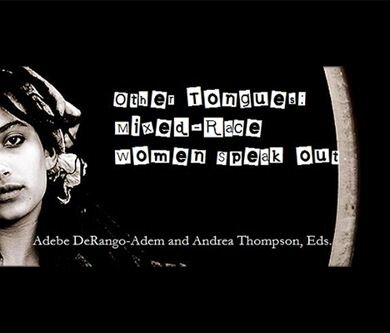Other Tongues: Mixed-Race Women in North America Speak Out
Creative Writing, Culture, Featured, The Arts — By Adebe D.A. on February 23, 2010 at 08:01Being interracial in Canada is about crossing borders: some imaginary, and some rigidly imposed. It is also about juggling with hyphens and margins, and struggling to carve out a space in Canada’s proclaimed multicultural imaginary – a space that, as many might argue, is largely make-believe in that it makes us believe that it’s better to evade than create meaningful discussions on race and racial difference.
Fellow interracial poet Andrea Thompson and I are the architects of a movement to carve out a new space for mixed-race populations by forwarding critical questions as well as creative strategies for thinking about race and interraciality. We are currently putting together an anthology on the experiences of mixed-race women in North America entitled Other Tongues: Mixed-Race Women Speak Out, with a focus on creative pieces that engage, document, and explore the experiences of being mixed-race by placing interraciality as the center, rather than periphery, of analysis.
Canada is part of the changing literary and cultural landscape of interraciality in the Western scheme of things, partly a product of U.S. President Obama who, for many, has renewed the faith of communities of colour to speak the truth to power. This shifting landscape is also a product of recent investigations by authors and artists into the largely buried history of miscegenation in this nation.
As interracial women both involved in the literary arts, Other Tongues: Mixed-Race Women Speak Out represents a collective effort to dismantle and detour hegemonic notions of race that serve to discount the existence of multiracial identities and histories. While many of these histories date back to the 19th century, it was not until the mid-nineties that the number of works on the mixed-race experience increased, and interracial artists were provided with a platform for critical and creative exchange. Since the years of praise that followed the publication of Carol Camper’s acclaimed Miscegenation Blues: Voices of Mixed Race Women in 1994, there has been little written on the continued constraints around mixed-race identification – and the possibility of seeing mixed-race as an identity category all on its own.
Civil rights was all about forwarding a crucial polemic against the suppressing of Black and mixed-race voices, and it is up to all writers and supporters of social justice to insist on the presence of these voices in media. Other Tongues represents an opportunity to revise racial categories, interrogate racism, and, as plain as it sounds, think honestly and deeply about race – and about the prime “revolutionary” demand that all those who identify with communities of color be treated with respect as social subjects. Or the other “revolutionary” demand at the heart of social justice: that our identities be based on the premise of self-determination.
Of course, the desire to be acknowledged as a social subject in history has long been attributed towards the desire for whiteness – a desire born from the reality of dispossession and invisibility characterized by being a person of color in America, and a desire that is perhaps somewhat heightened in Canada where, as many of us might have figured out, we don’t “see” race. But just as interracial identity is, I would argue, more than a dilemma of divided inheritance or impersonation – and not something that can be read literally or figuratively in Black/white terms – critically investigating how interracial identities bear meaning necessitates a rethinking of wholesale multi-culti celebrations of racial difference. The vogue for mixed-race and ethnic studies in the 1990s needs to be re-envisioned now and given more critical contours.
Picking apart the socially constructed elements of race will not end the effects of racism, but creativity can be a way to work through feelings of oppression. A creative project doubling as a political program is precisely what Other Tongues hopes to be: a collection of poems, stories, and other creative works that tell a different story about whose voice gets heard, by featuring upcoming voices that demand a readership who will listen with an open mind.
Submission Info
Other Tongues: Mixed-Race Women Speak Out, to be published in Fall 2010 by Inanna Publications, is accepting submissions until April 15. We are looking for previously unpublished submissions: Please send one (1) submission of up to 2500 words of poetry, fiction, creative non-fiction, or spoken word as a SINGLE attachment to [email protected]
Black and white images and artwork should be 300 dpi and sent as attachments in jpg. of tiff. format. Artwork and photography limited to three (3) per applicant.
Please include your contact information, including your name, address, phone number, e-mail, title(s) of work submitted, type of submission, and a short artist bio (50 words max) in the body of the email, with your name and the type of submission in the subject line (e.g. Jazmine – “Poetry Submission”).
For more information, email the editors at [email protected], join us on Facebook or swing by www.adebe.wordpress.com.
Tags: Culture, interracial, mixed-race, WomenAuthor: Adebe D.A. (11 Articles)

Race-Talk Cultural Editor Adebe D.A. is a Toronto-born writer and former research intern at the Applied Research Center, home of ColorLines magazine. A recent MA graduate in English/Cultural Studies, she writes on issues related to race, social justice, migration, and the phenomena of culture. She currently holds the honour of Toronto’s Junior Poet Laureate and is the author of a chapbook entitled Sea Change (Burning Effigy Press, 2007). Her debut full-length poetry collection, Ex Nihilo, will be published by Frontenac House in early 2010. Visit her blog at http://www.adebe.wordpress.com.




 Share This
Share This Tweet This
Tweet This Digg This
Digg This Save to delicious
Save to delicious Stumble it
Stumble it





 Native Americans believe there are dual systems of justice
Native Americans believe there are dual systems of justice Mitigating unnatural disasters: Transformative change and rebirth after the Haiti earthquake
Mitigating unnatural disasters: Transformative change and rebirth after the Haiti earthquake








1 Comment